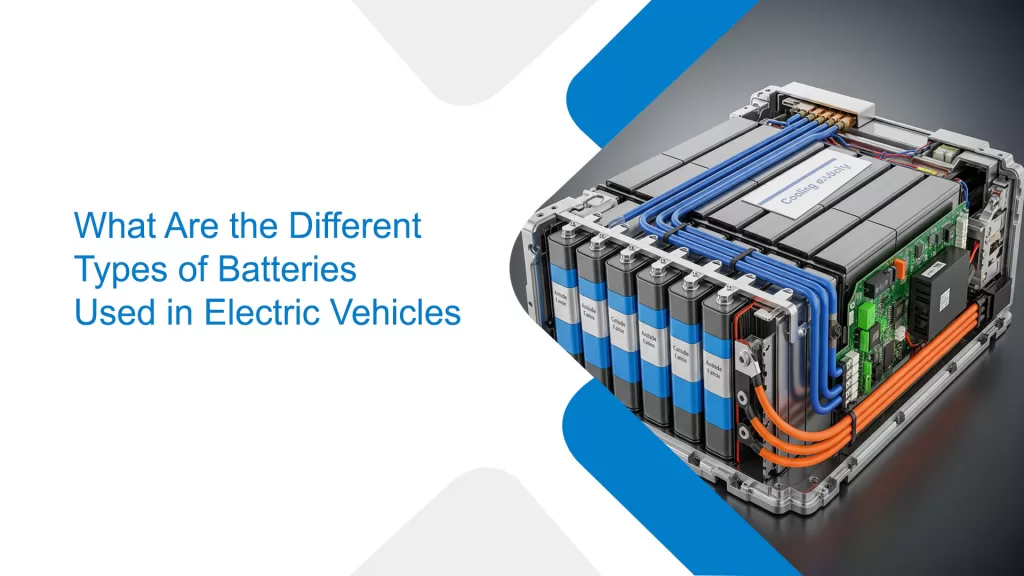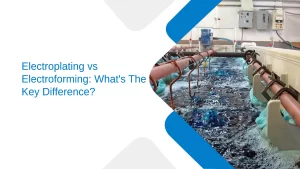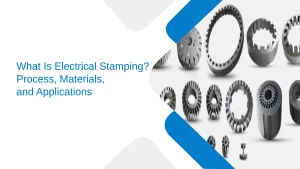Different Types of EV Batteries Used in Electric Vehicles
- Automotive & Ancillary |
- Aug 12, 2025

Electric vehicles (EVs) have transformed from a future gadget into an everyday necessity. The number of people switching from diesel and petrol vehicles to electric cars is increasing every year. The driving force of this transformation is the batteries used in electric vehicles.
We do not have to look that far in the future these cars are sleek and refined and equipped with cutting-edge battery technology. The electric vehicle world is diverse with electric vehicle battery types, each with unique attributes, advantages, and responsibilities.
Why Battery Chemistry Matters in EV Engineering
The chemistry inside a battery plays a major role in how an electric vehicle behaves. Some chemistries store more energy and help extend range, while others react quickly and support stronger acceleration. Heat tolerance varies from one chemistry to another, which means cooling systems must be designed to match. Different battery types wear out or lose capacity at different speeds. Some last a long time, while others degrade faster. Because of this, engineers have to think about how long the battery will stay healthy and how much it will cost over its lifetime when choosing which battery chemistry to use.
Types of Batteries Used in Electric Vehicles
Lithium-Ion Batteries
In conversations about electric vehicles, the batteries used in electric vehicles are the first topic that comes to one’s mind. Lithium-ion batteries for electric cars are in the cars as well, and they resemble more advanced and larger versions of smartphone and laptop batteries.
What makes them so popular? They help out drivers by improving range and efficiency as they compress a lot of energy into a small and lightweight design. This also makes parking overnight less of a problem, as there is less battery to lose.
What are the disadvantages? They are expensive and lose energy easily to extreme temperatures. They need a temperature control system for cooling and to safeguard them. Most owners of electric cars find the price justified given the many years of usage.
Types of Lithium-ion Batteries
1. Lithium Nickel Manganese Cobalt Oxide (NMC)
2. Lithium Nickel Cobalt Aluminium Oxide (NCA)
3. Lithium Iron Phosphate (LFP / LiFePO₄)
4. Lithium Manganese Oxide (LMO)
5. Lithium Titanate (LTO)
6. Lithium Cobalt Oxide (LCO)
Nickel-Metal Hydride (NiMH) Batteries
Chances are, you have experienced NiMH batteries if you have ever driven a hybrid, and they have a small role to fill in fully electric cars.
They are a one stop charging station in the form of a NiMH battery as they are perfect for consistent charging and discharging. However, they pack less energy and are heavier, making the range much shorter.
These are the absent minded option that you can fully rely on, think of them as a dependable workhorse – not sleek, but the perfect reliable driver.
Lead-Acid Batteries
Yes, the lead-acid battery is an obsolete technology, but it is still an ancient technology still relevant today. They are enduring electric vehicles to this day, proving to still be economical for the cheaper vehicles. They are the easiest to make, albeit cheap, and are still relevant to provide power backup for electric vehicles. They still fit the criteria for utility vehicles and are promising backup options for electric vehicles.
When it comes to the new driving options for the future, this does not cut it, as this comes with a bulk of issues. Compared to other options in the market, they still have a short lifespan, and the low distance driving problem with ABS vehicles means they are not the best in the market. If cost is the only criterion, they are perfect to get the job done.
Solid-state Batteries
They are being called the go-to, best choice available for the future, as they would be replacing the conventional lithium-ion batteries for electric cars. Solid-state batteries are the more preferred choice as they are lithium-ion based, with a solid material replacing the liquid electrolytes.
With this shift, it would be paired with electric vehicles that can travel double the distance on a single charge. The in-built protection of not being able to overheat means these batteries are more promising in regard to safety as well.
If progress is this good, we can hope to see these mainstream in electric cars in the next decade. Roughly priced would mean these are available as solid proxies for the next incoming generations.
Ultracapacitors
Ultracapacitors are not precisely e car battery but do warrant a mention. Instead of using chemicals, they store energy in an electrostatic field.
In EVs, they are used in conjunction with the main vehicle battery, as they provide the vehicle with energy during hard acceleration and during regenerative braking. This duo works in tandem to provide a quick boost of energy and subsequently reduces strain on the main battery for electric cars, which helps extend its longevity.
Comparison Table of EV Batteries
| EV Battery Types | Benefits | Drawbacks |
| Lithium-ion | High energy, light, long life | Expensive, heat-sensitive |
| NiMH | Reliable, long cycle life | Heavy, low energy, memory effect |
| Lead-acid | Very cheap, recyclable | Very low energy, short life |
| Sodium-ion | Low cost, safe, good in cold | Low energy, still developing |
| Solid-state | Very high energy, very safe, fast charging | Expensive, not widely available |
| Ultracapacitors | Ultra-fast charging, long life | Very low storage, cannot power EV alone |
EV Battery Cell Formats and Their Engineering Implications
The shape of a battery cell plays a big part in how easily the pack fits inside the vehicle and how well it can be kept cool. It also affects how the pack handles vibration, stress, and daily wear. Modern electric vehicles typically utilise one of three primary EV battery component cell shapes, each supporting a slightly different approach to EV battery pack design.
Cylindrical Cells
Cylindrical cells, like the 18650, 21700, or the newer 4680 models, are known for their sturdy, tube-like structure, which naturally handles mechanical stress well. Their round shape helps spread heat evenly, making temperature control a bit easier. Packs built with these cells include many small units connected, so the number of electrical connections adds up. Still, the manufacturing process for cylindrical cells is very mature, so production tends to be reliable and consistent.
Prismatic Cells
Pouch cells use a soft, flexible casing instead of a metal shell, which makes them light and easy to arrange inside tight spaces. Since they can swell a little during use, they need some form of pressure or support to keep them flat. Designers usually plan simple clamping plates or structural frames to hold them in the right shape.
Pouch Cells
Pouch cells use a flexible outer layer instead of a metal case, which keeps them light and easy to arrange. They can swell a little during operation, so they must be held in place by clamps or a frame that keeps them flat. In most battery packs, this is handled through simple clamping plates or a carefully designed enclosure that holds the cells in place without allowing movement
Choosing the Right EV Battery
When it comes to electric vehicles and their batteries, the following points should be taken into consideration:
- Distance Requirements: What is the average daily drive distance?
- Speed of Charging: Does the user have access to a fast charger, or is it a home-only charger?
- Weather: Certain batteries manage heat and cold better.
- Finances: An initial investment versus the value in the long run.
- Type of Vehicle: Different for a city car versus a high performance EV.
The ideal and most accurate solution is not available as it varies from user to user based on their requirements.
Engineering Considerations in EV Battery Design
Temperature control is one of the most important parts of battery design. Chemistries with more nickel tend to heat up faster, so they usually need stronger cooling to stay within a safe range. LFP cells stay more stable and can work even with simpler cooling systems. Depending on the vehicle, cooling might involve liquid channels, refrigerant lines, immersion-style systems, or sometimes basic airflow.
The BMS keeps an eye on each cell by tracking its temperature, voltage, and overall balance. It helps the pack run smoothly and avoids situations where one part of the battery drifts too far from the others. Chemistries such as NCA and high-nickel NMC can react quickly to changes in heat or charge levels, so the BMS must keep a close eye on them. If the system misreads the battery’s condition or charge level, the pack may not perform well or might wear out sooner than expected
When engineers design a battery pack, they also have to think about how well it can handle bumps, vibration, and normal road stress. The pack needs to be strong enough to protect the cells without adding unnecessary weight. It also has to slow down or prevent heat from spreading if a cell fails. To achieve this balance, many packs use aluminum, high-strength steel, or composite structures
Different chemistries age at different speeds. LFP tends to lose capacity slowly and steadily. NMC and NCA can lose capacity faster if they’re exposed to high heat or kept fully charged for long periods. LMO usually fades more quickly, while LTO lasts a long time but offers less energy per kilogram. Knowing how each chemistry wears over time helps engineers plan warranties and estimate how long the battery will perform well in real driving.
Global and India-Specific Battery Trends
Worldwide, EV manufacturers are adopting high-nickel chemistries for long-range vehicles. They are also exploring new pack designs such as structural packs and larger cylindrical formats like the 4680 cell. Solid-state research is accelerating, and recycling systems are expanding as more EVs reach end-of-life.
In India, LFP is becoming more common because it handles heat well and remains stable in extreme weather. Sodium-ion batteries may soon enter the market for more affordable EVs. As adoption grows, engineers focus on which chemistry suits India’s climate, driving habits, and cost expectations.
Also Read: Inside the Electric Car Engine: The Future of Automotive Power
Final Thoughts
The range of batteries used in electric vehicles is from lead-acid to solid state and is constantly evolving. The evolving technologies will be accompanied by a shifting market, in which lithium-ion batteries for electric cars are supplanted by new technologies that can be incorporated.
Having a deep understanding of the strengths and trade-offs of each electric vehicle battery type allows for smarter purchase decisions, whether that be a purchase for maximum range, lower cost, or cutting-edge innovation.
Choosing car batteries today will not only determine the power efficiency, but will also shape the experience yous driving the car for a considerable amount of time.
FAQs
Q1: What batteries are used in electric cars most often?
The most used batteries in electric cars are lithium-ion batteries for electric cars as they provide the best range, weight, and life span balance.
Q2: How long do EV batteries last?
Depending on usage and weather, most batteries last between 8 to 15 years.
Q3: Can EV batteries be replaced?
Yes, but the price varies with the vehicle’s make and model.
Q4: Are EV batteries recyclable?
Yes, as the number of EVs on the road increases, the focus on recycling EV batteries is also increasing.
Q5: Which battery chemistry offers the highest energy density for EVs?High-nickel NMC and NCA chemistries generally deliver the highest gravimetric energy density in commercial EVs.
Q6: Why do some EVs use LFP instead of NMC?
LFP offers excellent thermal stability, long cycle life, and lower cost, making it suitable for mass-market and high-temperature environments.
Q7: What cell format is best for thermal management?
Cylindrical cells provide uniform thermal distribution and structural rigidity, often simplifying cooling system design.




